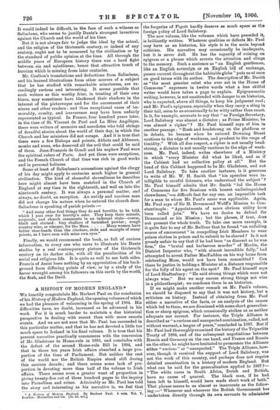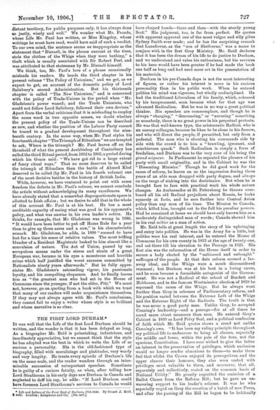A HISTORY OF MODERN ENGLAND.*
WE heartily congratulate Mr. Herbert Paul on the conclusion of his History of Modern England, the opening volumes of which we had the pleasure of welcoming in the spring of 1904. His difficulties have, no doubt, increased as he advanced in his work. For it is much harder to maintain a due historical perspective in dealing with recent than with more remote events. And we are not sure that Mr. Paul has succeeded in this particular matter, and that he has not devoted a little too much space to Ireland in his final volume. It is true that his present narrative practically commences with the conversion of Mr. Gladstone to Home-rule in 1885, and concludes with the defeat of the second Home-rule Bill in 1894, and that in those ten years Irish affairs absorbed a large pro- portion of the time of Parliament. But neither the rest of the world nor the British Empire stood still during this anxious decade; and there seems some lack of pro- portion in devoting more than half of the volume to Irish affairs. There seems even a greater want of proportion in giving twenty-five out of three hundred pages to the inquiry into Parnellism and crime. Admirably as Mr. Paul has told the story and interesting as his narrative is, we feel that * A Etatory of Modern England, By Herbert PanL 5 vole. Vol. V. London : Macmillan and Co. [8s. 6d. net.] the forgeries of Pigott hardly deserve as much space as the foreign policy of Lord Salisbury.
The new volume, like the volumes which have preceded it, is brilliantly written. Whatever qualities or defects Mr. Paul may have as an historian, his style is in the main beyond criticism. His narrative may occasionally be inadequate, but it is never dull. He has the capacity of coining an epigram or a phrase which arrests the -attention and clings to the memory. Such a sentence as "an English gentleman, like an English sovereign or an English bill of exchange, passes current throughout the habitable globe "puts us at once on good terms with its author. The description of Mr. Davitt as "the most genuine rebel who ever sat in the House of Commons" expresses in twelve words what a less skilful writer would have taken a page to explain. Epigrammatic writing, however, is not unattended with danger to an historian, who is expected, above all things, to keep his judgment cool; and Mr. Paul's epigrams, especially when they carry a sting in their tail, seem to us occasionally to be witty rather than exact. Is it, for example, accurate to say that "as Foreign Secretary, Lord Salisbury was almost a dictator ; as Prime Minister, he was almost a cipher" ? Mr. Paul himself says of him in another passage : "Rash and headstrong on the platform or in debate, he became when he entered Downing Street cautious to the edge of weakness, and prudent to the verge of timidity." With all due respect, a cipher is not usually head- strong, a dictator is not usually cautious to the edge of weak- ness. Mr. Paul, indeed, writes elsewhere of a Ministry in which "every Minister did what he liked, and as if the Cabinet had no collective policy at all." But the head of this Cabinet happened to be Mr. Gladstone, and not Lord Salisbury. To take another instance, is it generous to write of Mr. W. H. Smith that "his speeches were in- telligible to careful listeners, who understood the subject" Mr. Paul himself admits that Mr. Smith " led the House of Commons for five Sessions with honest undistinguished shrewdness,"—a difficult feat for any one, an impossible task for a man to whom Mr. Paul's sneer was applicable. Again, Mr. Paul says of Sir H. Drummond Wolff's Mission to Con- stantinople: "Appointments of more obvious utility have been called jobs." We have no desire to defend Sir Drummond or his Mission ; but the phrase, if true, does not present the whole truth. To take one more example, is it quite fair to say of Mr. Balfour that he found "an unfailing source of amusement" in compelling Irish Members to wear prison clothes in prison and to submit to be shaved ? Is it not grossly unfair to say that if he had been "as discreet as be was firm," the "brutal and barbarous murder" of Martin, the District Inspector who, "with almost incredible folly," had attempted to arrest Father MacFadden on his way home from celebrating Mass, would not have been committed ? Can there be justice in holding a Minister at a distance responsible for the folly of his agent on the spot? Mr. Paul himself says of Lord Shaftesbury : "He said strong things which were not always wise." But we may excuse strong things not wise in a philanthropist; we condemn them in an historian.
If we might make another remark on Mr. Paul's volume, we should be disposed to say that it was not history, but a criticism on history. Instead of obtaining from Mr. Paul either a narrative of the facts, or an analysis of the causes which led to them, we are dismissed with some short generalisa- tion or sharp epigram, which occasionally strikes us as neither adequate nor correct. For instance, the Triple Alliance is described as" a curious and unexpected combination, called, not without warrant, a league of peace," concluded in 1887. But if Mr. Paul had thoroughly examined the history of the Tripartite Treaty of 1884, and of the subsequent negotiations between Russia and Germany on the one hand, and France and Russia on the other, he might have hesitated to pronounce the Alliance either " curious " or "unexpected." The Triple Alliance, how- ever, though it received the support of Lord Salisbury, was not the work of this country, and perhaps does not require detailed examination in a history of modern England. But what can be said for the generalisation applied to 1887 I)— " The white races in South Africa, Dutch and British, have no cause of quarrel. The black man, if he had been left to himself, would have made short work of both." That phrase seems to us almost as inaccurate as the follow- ing :—" Whenever and wherever the British Government has undertaken directly through its own servants to administer
distant territory, for public purposes only, it has always done no justly, wisely and well." We wonder what Mr. Fronde, whose Life Mr. Paul has written, or Miss Kingsley, whose writings he must have read, would have said of such a verdict. To our own mind, the sentence seems as- inappropriate as the statement that "Disraeli, in the phrase current at the time, stole the clothes of the Whigs when they were bathing," a theft which is usually associated with Sir Robert Peel, and was attributed to that statesman by Mr. Disraeli himself.
We think, too, Mr. Paul's love of a phrase occasionally misleads his readers. He heads the third chapter in his present volume "The Policy of Unionism," and we get, as we expect to get, an account of the domestic policy of Lord Salisbury's second Administration. But his thirteenth chapter is called "The New Unionism," and is concerned with the policy of Trade-Unions in the period when "Mr. Gladstone's power waned; and the Trade Unionists, who could not follow Lord Salisbury, followed their own devices." Apart from the verbal criticism that it is misleading to employ the same word in two opposite senses, we doubt whether the present policy of the Trade-Unions can be described as new, and whether the position of the Labour Party cannot be traced to a gradual development throughout the nine- teenth century. In the same way, when Mr. Paul styles his fourteenth chapter "The Triumph of Ritualism" we are tempted to ask, Where is the triumph P Mr. Paul leaves off on the threshold of what the present Archbishop of Canterbury has called the third Ritual period, from 1892 to 1905, a period during which his Grace said: "We have got rid to a large extent of fancy ritual ways." That no more deserves to be called the triumph of Ritualism than the battle of Ahmed Khel deserved to be called (by Mr. Paul in his fourth volume) one of the most decisive battles in the history of British India.
While, however, we have ventured to point out with some freedom the defects in Mr. Paul's volume, we cannot conclude the article without acknowledging its many excellences. We have already stated that a somewhat disproportionate space is allotted to Irish affairs ; but we desire to add that in the whole of this account Mr. Paul is at his best. He has a most creditable capacity of seeing what was good in his opponent's policy, and what was unwise in his own leader's action. He thinks, for example, that Mr. Gladstone was wrong in 1886. "It would have been better to put off Home Rule for a year than to give up three acres and a cow," is his characteristic remark. Mr. Gladstone, he adds, in 1890 "seemed to have lost for a time his sense of relative values. The most trifling blunder of a Resident Magistrate looked to him almost like a convulsion of nature. The Act of Union, passed by un- scrupulous means under the stress and strain of a great European war, became in his eyes a monstrous and horrible crime which half justified the worst excesses committed by Nationalists ninety years afterwards." But he fully appre- ciates Mr. Gladstone's astounding vigour, his passionate loyalty, and his compelling eloquence. And he finally leaves him as "the greatest man who had sat in the House of Commons since the younger, if not the elder, Pitt." We must not, however, go on quoting from a book with which we trust that many of our readers will make acquaintance themselves. If they may not always agree with Mr. Paul's conclusions, they cannot fail to enjoy a writer whose style is so brilliant and whose narrative is so clear.















































 Previous page
Previous page